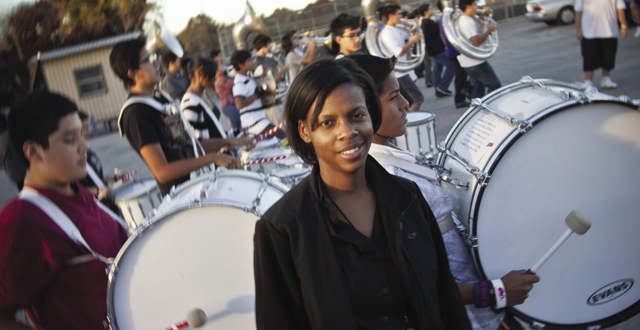The Sunset High School marching band won the Dallas High School Battle of the Bands. Here’s how.
On a cold morning in October, the Sunset High School marching band entered the field at Kincaide Stadium for the DISD High School Battle of the Bands.
Its performance, which included Young Jeezy’s “R.I.P.,” was a showstopper.
That day, for the first time ever, the Sunset band members walked away with the first-place trophy. In the previous two competitions, they had come in second to their neighborhood rival Townview.
“It was a big moment for the kids,” says band director Rametria Smith. “It was a long time coming.”
The road to success has been a long one for Smith and the Sunset band.
When she arrived at Sunset eight years ago, the school just had one concert band. Not many students enrolled in band, Smith says.
“There was a nucleus here that had a lot of heart, and those kids had a desire to do better,” she says.
Since 2005, the Sunset band program has grown to include two concert bands, the marching band and two ensembles.
What is your background?
I’m a product of DISD. I graduated from the Communication/Humanities Magnet at Lincoln High School. This is my 13th year as a band director. I spent three years at Sam Houston Middle School in Garland, and I was an assistant band director at John Tyler High School in Tyler before I came back to Dallas.
When did you decide you wanted to be a band director?
My junior year in high school, I knew I wanted to be a band director. I originally thought I wanted to be a journalist, actually. But I come from a long line of educators. My mom has been in the profession 37 years. And I also come from a long line of musicians. I never strayed from music, so I ended up in the humanities cluster at Lincoln, and by my junior year, I was like, “I want to teach.” Some people were like, “Are you sure?” because it’s not that common a profession for women.
Congratulations on your Battle of the Bands win.
Thank you. We’ve been kind of battling our rivals for a few years now. We’ve been crowd pleasers twice, but it wasn’t enough to win the trophy. We also placed in all the subcategories. The drum majors, majorettes and flags all placed. We also received a Division One rating from UIL; this is the second year in a row. Last year, we advanced to the area marching band contest, and we were the only DISD school that did that.
How much do you practice outside of school?
We put in about eight hours a week outside of class.
How did you put the band program back on track?
The movie “Drumline” had come out not too long before I arrived, and those kids could almost recite the movie. So the first thing I did was try to move to a transition into marching band because I knew that would be exciting for the kids. And everything else was birthed through that.
How did you start the marching band?
I listened to the kids’ ideas about what they wanted, and then I shared my vision. Those kids had a desire and a grind about them. After we decided what we wanted, we had to make a plan — short-term and long-term goals. One component of that was asking them what they were going to do. What would their direct impact be? Student leaders are a big part of it. This is a student-led and student-run organization on all levels. They learn social skills, self-discipline, making good decisions, time management. The salutatorian is in the band. Half the band [members] are in AP classes. These kids are doing it themselves; I’m just here to guide them.
How do you develop leaders?
I just try to guide them to make quality decisions and look at the consequences. Are your actions leading to us being successful and leading us forward, or are they hindering us? Our motto is “We exhibit our character.” The kids just know this is what’s expected across the board; there’s no favoritism. The kids know that. And there have been kids who have been removed from this program. Some have come back looking for a second chance, and there are not many who have been granted that second chance.
How do you raise money for the band?
We have a band booster club. That was one thing that I had to really try to get up and running. We have a new board this year, and those parents work a booth at AT&T Stadium monthly. They do various fundraisers throughout the year. Also, the band participates in fundraisers … we’re selling chocolate right now… Those funds are for general operation, supplies, transportation … Every other year, we’ve taken an out-of-state trip, then an in-state trip.
Why do you do this?
I get to expose the kids and make connections for kids across the board. Music is math. It’s scientific. There are so many aspects of other curricula. Often the kids don’t even realize it. And then from a cultural standpoint, if we go perform for an event, there is always a lesson there. We performed at the Mexican Consulate two years ago, and we have a predominantly Hispanic student body, so you assume all these kids are Mexican-American and they know things about Mexico, but that’s not necessarily true. Even Mardi Gras; when we perform at the Mardi Gras parade, it’s like, OK, what is Mardi Gras? What does it mean, and why do we celebrate it? I love being a teacher, but teaching music is the coolest thing.
What’s next for the Sunset band?
When I first started, I promised our former principal that I would revive the mariachi band. It had disbanded right before I arrived. I’ve been to a lot of workshops and performances, and now I’m trying to locate the funds for the things we need. I’m working with choir director Jon Sarver and assistant band director Salomon Elias on it. So we should have a mariachi band in the next few years.






